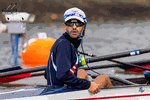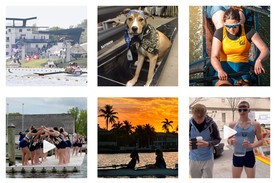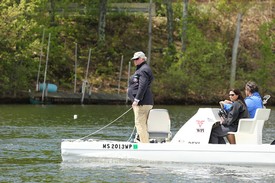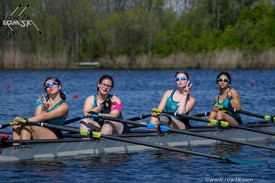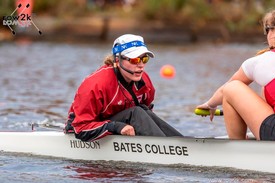In the Driver's Seat, with Anya Eichenlaub
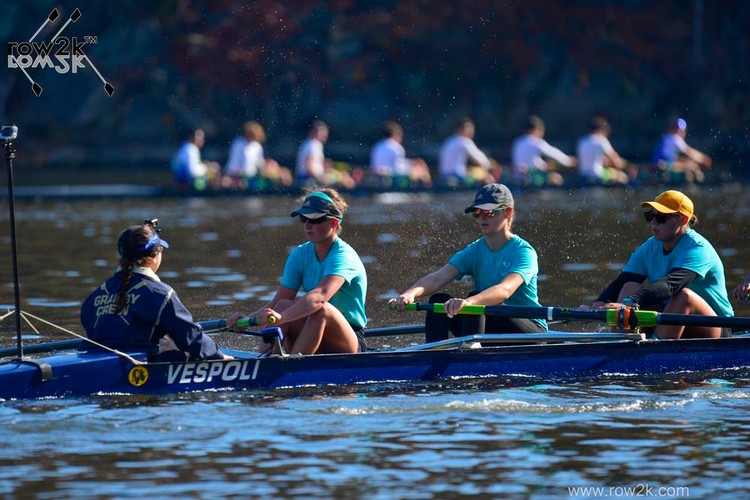
Next up In The Driver's Seat--where we hear from the folks who add that extra something to the teamwork of a crew--is coxswain Anya Eichenlaub.
Anya coxes at Granby High School, where she got her career started with a silver medal at the Virginia State Championships (VASRA) in 2022. She has helped the team to two regional silvers as well, and was named a team MVP last year.
Anya also spends summers getting extra race experience with a few masters crews at the Hampton Roads Rowing Club, and said she is an avid reader of this column.
Let's hop In The Driver's Seat with Anya:
row2k - What do you see as the three most important things for being a successful coxswain?
Anya Eichenlaub - The highest priority for any coxswain should always be safety. Everything below that should either be an extension of safety or a way to potentially assist it, and these are the three I focus on.
Communication: I've always been a great speaker; it's one of the things that drew me to the coxswain seat in the first place. Last fall, I had a men's 8 at practice with my head coach, Paul Coslick, in stroke seat since we were down a guy that day. As we were running through a drill, he talked to me about how it is not good enough to just be loud, but I should also pay attention to my intonation and rhythm of my calls. He talked to me about how that helps to drive and work with the rhythm of the boat. I started working on not just my volume and energy in my voice, but also my intonation and cadence.
Making your calls clear can make all the difference. My whole novice year was filled with feedback from my rowers about how they couldn't hear me in bow, couldn't understand my calls because I was not annunciating, and also about how long I took to make my calls. My coxswain coach took my first varsity year to eliminate extra words in my calls. I was no longer allowed to say "alright", "ok", or "um" before any of my calls. We also shortened my calls on land. Instead of "up to heads, ready, up!" I worked to say, "heads, ready, up!" and instead of, "roll down towards stretchers, ready, roll!" it became, "stretchers, ready, roll!". The goal is to make your calls as efficient and clear as possible; always being heard, always being safe, always being precise.
Confidence: This has always been one of my personal struggles as a cox, even on my best days. I learned quickly how coxswains emotionally affect the whole crew, and how my nervousness affects my rowers. Some confidence came with time and experience, some came from advice by my coaches, some came from my teammates, and the rest came from knowing that being in that seat is my life.

Such a large part of my personal confidence comes from my passion for the sport. Getting to practice knowing that this is my thing helps me immensely. Knowing that all the coxswain recordings I watch, the In The Driver's Seat columns I read, the podcasts I listen to, the conversations with my coaches, and all of it is work I've put in to become better at my craft gives me that little extra confidence boost I need on my hard days. And if all that doesn't do it, I remember that this seat is where I put all the best parts of myself.
Energy: Part of this is confidence, but part is taking care of yourself. As coxswains, we are often taking care of our rowers: making sure they've all eaten enough before our race, taking a quick water break during practice, easing any final concerns before race day. We stay calm for the sake of our rowers, even when it's hard. None of this matters if the cox isn't taking care of themselves, too. I've learned how easy it is to get so wrapped up in taking care of everyone and everything else that you can forget to take care of yourself. You can't practice 20 hours a week for 3 seasons a year without taking care of your own health. As much as practice is the outlet for my mental health, taking care of it outside of the boat helps me come to practice more ready and more focused. The other part of energy is physical energy. Coxing can be just as physically draining as it is mentally, and your body needs to be fueled just as much as your rowers' bodies. I've had the experience of learning what happens when your body isn't physically prepared for practice. Without taking care of yourself, you're not going to be capable of bringing everything to the seat.

row2k - What is your favorite drill to run with your crews? Any tips on how to the drill well, for maximum effectiveness?
Anya Eichenlaub - Cut the Cake drill is a favorite on my team. We take three to five full strokes, and then with blades feathered and out of the water, they just swing arms and body forward, then go back to the finish position together, and swing arms and body again to take a full stroke through the water. The drill focuses on body swing together, with an emphasis on the swing at the hips, leaning out towards your rigging at the finish, and still keeping the set.
I use this drill to call for body swing, quick hands away, and lots of length. I explain what movement I'm seeing in the crew so they can have an understanding of what they've improved on and what they can still do better. If a crew doesn't understand why the drill is necessary and how it will make them better, it will never be effective.
row2k - What's some of the best coaching advice you've received about your coxing?
Anya Eichenlaub - "Get back to basics."
Whenever I'm in doubt about my coxing, or what my next move is, I go back to basics. My coxswain coach, Becca Beach, first said this to me last fall. I had told her that I felt like I'd fallen behind, and that I was not meeting the expectations I needed to meet, both the ones set by my coaches, but more so the ones set by myself. She told me, "Anya, you're overthinking it. You're moving too fast and not trusting your gut anymore. Go back to basics. You know this stuff."
Sometimes the most complex problems on the water can have the simplest solutions. Often, simple calls can be the most effective. It's the foundation we build early on that can set the path for the rest of our lives in the seat.

row2k - What is a mid-race call or move that you've made that you'll remember for the rest of your life?
Anya Eichenlaub - "Make it worth it."
I've called this in very few races, but when I have it has caused some of the best energy shifts I've felt in the boat. It's one of my most intentional calls, with my goal being to feel that final shift we need during a race. I love calling it at races towards the end of a season, like regionals or states.
I've found this call has a lot of deeper meaning for not just my rowers, but for myself as well. "It" is a very broad term, and something that's even prompted discussion off the water within my lineups. For some of my rowers, it's using all the physical training they've done and seeing what they can get out of it. For a couple of my rowers, especially those who have had an injury, it's a chance to prove something to themselves. For others, and even for myself, it's showing that every mental barrier we've faced was worth it to get where we are at that moment.
I generally call it towards the end of a race, probably 100-150m before our sprint. This is a call I really annunciate and am even louder about. I choose this moment because of where the rowers are mentally at this point in the race. You're three-quarters of the way through, your rowers are exhausted and so close to that final gear. It's a wake up call, and a chance to look back on the last 1000 meters and see how far you've come. Every stroke counts, so make every stroke worth it.

row2k - Can you tell us anything about how you learned how to steer straight?
Anya Eichenlaub - The water my team and I practice on is often more similar to coastal conditions than the flat lakes and reservoirs many other teams have. The river we're on has many challenges, such as day markers, bridges, extreme tidal conditions, marshy backwaters, docks jutting out, recreational powerboats, and is mostly unsheltered. Living in Southeastern Virginia, our wind patterns are generally predictable because of the gulf stream. It became part of my morning routine to check not just the weather and wind, but also the tide charts of my local waterways. Every practice provides a new challenge for my driving. I learned how to steer straight by not steering straight.
My first fall season, I was lucky to have the practice site I did, because it provided strong currents that challenged every attempt I made to drive straight. I learned the importance of minor adjustments and using a point, so I could avoid overcorrecting my steering and also protect the set of the boat.
I also learned through opportunities during land training. I'm an extremely visual learner, so occasionally during land training my coxswain coach and I sit down and use things as simple as sunscreen bottles and popsicle sticks to model docking, backing, and other maneuvers. We discuss the most absurd hypothetical scenarios, and all the potential solutions to them. This helps me learn how to steer straight, but also how to efficiently maneuver my crews in other ways. These are often some of my favorite practices, because my knowledge of the river is really put to the test. We can pinpoint exactly where strengths and gaps in my knowledge are, and talk about how to correct them.
After these discussions I go back on the water and apply them. Every day on the water provides a new challenge; what's important is how I face it, and how it comes into play on race day.
row2k - Tell us about the best race/practice you've ever had? Anya Eichenlaub - I had an amazing season last spring with my MJ4+. We had a great time and I loved coxing those guys, but I can't not talk about my novice season two years ago.

Our race at VASRA States my novice year was everything I'd hoped it would be. We'd placed in our heat, and moved on to finals. It was freezing and windy and rainy, but my WN4+ was so excited at the possibility of going home with our first-ever state medals that the weather was easy to ignore.
It was one of the closest races I've ever coxed. The team who got 1st stayed about 50m ahead of us pretty much from the start, but I stayed focused on lanes 3 and 6, finding opportunities to walk on them. I was calling seats the whole race, whether it was ones we'd gained or ones we'd lost. The energy in that lineup was unmatched; my teammates fighting the whole way through. Finally, our sprint came and we walked right through both crews for silver. It wasn't first place, but it was still an incredible end to our novice season. We got to that medals dock with the biggest smiles on our faces, and still joke about how bad the pictures are of us holding up our silver medals. I love this race because as much as it was my best coxing at that point in time, it's also a race I can look back on to see how far I've come and how much I've improved.
Thanks for riding along with Anya, and remember, this column is open to all "drivers" out there, so if you are an experienced coxswain at any level--from juniors to masters--and would be willing to invite row2k to join you in your ride, just contact us here. We'd love to hear from you about what you see from the Driver's Seat.
If you enjoy and rely on row2k, we need your help to be able to keep doing all this. Though row2k sometimes looks like a big, outside-funded operation, it mainly runs on enthusiasm and grit. Help us keep it coming, thank you! Learn more.
Comments | Log in to comment |
There are no Comments yet
| |
- Bont Rowing
- Calm Waters Rowing
- Concept 2
- Craftsbury Sculling
- The Crew Classic
- CrewLAB
- Croker
- Dad Vail Regatta
- Durham Boat Co.
- Empacher
- Faster Masters
- Filippi
- Fluidesign
- h2row.net
- HUDSON
- Live2Row Studios
- Nielsen-Kellerman
- Oak Ridge RA
- Peinert Boat Works
- Pocock Racing Shells
- Race1 USA
- Rockland Rowing Masters Regatta
- RowKraft
- Rubini Jewelers
- Vespoli USA
- WinTech Racing
- Bont Rowing
- Calm Waters Rowing
- Concept 2
- Craftsbury Sculling
- The Crew Classic
- CrewLAB
- Croker
- Dad Vail Regatta
- Durham Boat Co.
- Empacher
- Faster Masters
- Filippi
- Fluidesign
- h2row.net
- HUDSON
- Live2Row Studios
- Nielsen-Kellerman
- Oak Ridge RA
- Peinert Boat Works
- Pocock Racing Shells
- Race1 USA
- Rockland Rowing Masters Regatta
- RowKraft
- Rubini Jewelers
- Vespoli USA
- WinTech Racing




